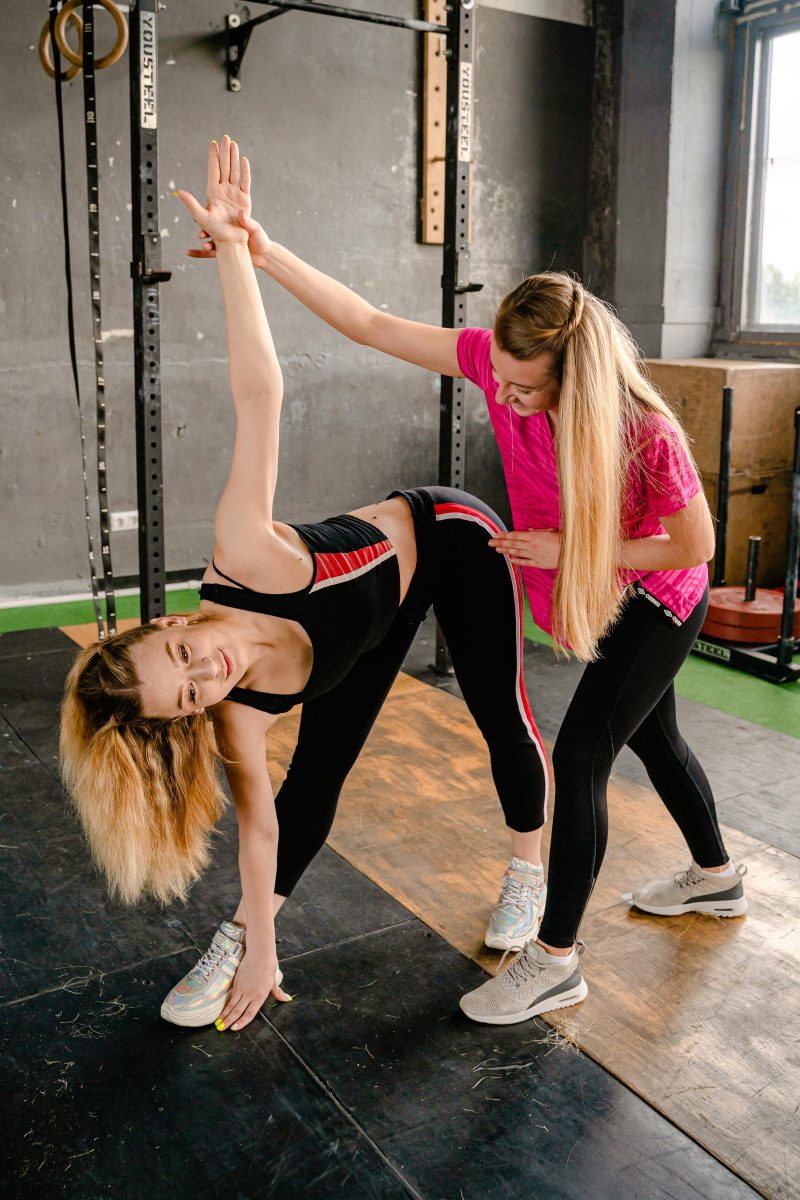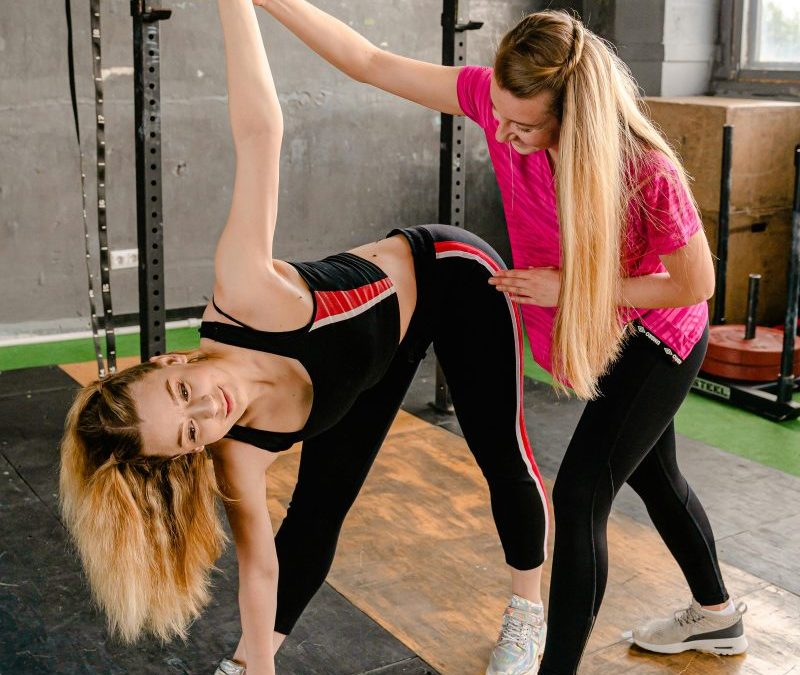Last Updated on: 14th July 2024, 09:33 am
Understanding Gym Anxiety

Gym anxiety, a common hurdle for many, is the feeling of tension, nervousness, or unease about going to or participating in gym activities. Symptoms often include:
- Racing heart
- Excessive sweating
- An overwhelming sense of being judged
It’s particularly prevalent among beginners, who may feel intimidated by more experienced gym-goers or self-conscious about using the equipment incorrectly.
This anxiety can significantly impact one’s fitness goals. It may lead to skipping gym sessions, not pushing oneself to try new exercises, or even giving up on fitness endeavors altogether. The fear of judgment or failure overshadows the excitement of progress, creating a barrier that feels insurmountable.
However, understanding that this anxiety is a common experience can be the first step towards overcoming it. Recognizing the symptoms and acknowledging their effect on your fitness journey allows for the development of strategies to combat these feelings. With the right approach, the gym can transform from a place of fear to a sanctuary of personal growth and achievement.
Identifying the Root Causes

Fear of judgment and comparison often lies at the heart of gym anxiety. Many beginners worry about:
- Not measuring up to the seasoned gym-goers around them
- Feeling paralyzed, making it difficult to even step foot in the gym
Lack of familiarity with gym equipment also plays a significant role. The array of machines and weights can seem daunting to someone who’s never used them before. This unfamiliarity can lead to a fear of using equipment incorrectly, potentially causing embarrassment or, worse, injury.
Finally, the sheer overwhelm from not knowing where to start can stop many in their tracks. With so many options available—cardio, weights, classes—it’s easy to feel lost. This feeling of being overwhelmed is akin to standing at the foot of a mountain, unsure of the path to the summit. However, every journey begins with a single step, and the gym is no different. Starting small and building gradually is a tried and true method for overcoming this hurdle.
Strategies for Overcoming Gym Anxiety

Setting Realistic and Personal Fitness Goals
Embarking on your fitness journey with realistic and personal goals is like having a compass in the vast sea of health and wellness. It guides your path, ensuring every step is purposeful and directed towards your ultimate destination. By tailoring your objectives to fit your unique lifestyle and capabilities, you cultivate a sense of ownership and motivation that is deeply personal. This approach not only demystifies the process but also makes the journey more enjoyable and fulfilling.
Familiarizing Yourself with the Gym Environment
Stepping into the gym for the first time can feel like entering a new world. To ease this transition, take time to familiarize yourself with the environment. A simple tour of the facility can work wonders, transforming the unknown into the familiar. Understanding the layout, locating the equipment you plan to use, and even learning the peak hours can significantly reduce anxiety. This knowledge empowers you, turning the gym from a place of intimidation into a welcoming space for growth and self-improvement.
Starting with Simple Exercises to Build Confidence
Confidence in the gym is built one step at a time. Begin with simple exercises that you feel comfortable performing. This could be anything from using the treadmill to basic bodyweight movements. The key is to start small and gradually increase the complexity of your workouts as your confidence grows. This methodical approach not only prevents overwhelm but also fosters a sense of achievement with each session. As your familiarity with different exercises increases, so too will your confidence, making the gym a place of empowerment and progress.
Building a Support System

Finding a Gym Buddy or Joining a Fitness Community
Embarking on a fitness journey can be daunting, but you don’t have to do it alone. Finding a gym buddy or joining a fitness community can make all the difference. A workout partner provides:
- Motivation
- Accountability
- Friendly competition
Similarly, fitness communities—whether in-person or online—offer a wealth of support, advice, and encouragement. They remind you that everyone starts somewhere, and there’s strength in numbers.
Considering Personal Training Sessions for Guided Support
For those seeking more personalized guidance, personal training sessions are invaluable. A certified trainer can tailor workouts to your goals, teach proper technique, and provide the encouragement needed to push past your limits. This one-on-one support demystifies the gym experience, making it less intimidating and more accessible. It’s an investment in your health that pays dividends in confidence and results.
Utilizing Online Resources and Forums for Advice and Encouragement
In today’s digital age, a wealth of information is just a click away. Online resources and forums are treasure troves of advice, workout plans, and moral support. Whether you’re looking for tips on overcoming gym anxiety or seeking encouragement after a tough day, there’s a community online ready to lift you up. These platforms allow you to learn from others’ experiences and share your own, creating a cycle of support that extends far beyond the gym walls.
Mindfulness and Positive Self-Talk: Your Allies in the Gym

Techniques for Managing Anxiety in the Moment
When anxiety strikes, grounding yourself in the present can be a powerful antidote. A simple yet effective technique is focused breathing. Inhale deeply, hold for a moment, and exhale slowly. This process calms the nervous system, reducing immediate feelings of anxiety. Additionally, scanning your body from head to toe, acknowledging areas of tension, and consciously relaxing them can also help. These practices of mindfulness bring your focus back to the now, easing worries about judgment or failure.
The Role of Positive Self-Talk in Overcoming Gym Intimidation
Positive self-talk is a formidable tool against gym intimidation. Remind yourself of your strengths and accomplishments, no matter how small they may seem. Replace thoughts like “I can’t do this” with “I’m here to improve, and that’s what counts.” This shift in mindset fosters a more compassionate and encouraging internal dialogue, which can significantly diminish feelings of intimidation and self-doubt.
Incorporating Mindfulness Practices into Your Fitness Routine
Integrating mindfulness into your fitness routine can transform your gym experience. Begin your workout with a moment of gratitude for the opportunity to improve your health. During exercise, maintain a focus on your breath and the movement of your body, fully immersing yourself in the experience. This practice not only enhances your workout but also strengthens your mental resilience, making the gym a space of personal growth and mindfulness.
By embracing mindfulness and positive self-talk, you equip yourself with powerful strategies to overcome gym anxiety. These practices foster a supportive internal environment, enabling you to face challenges with confidence and grace. Remember, the journey to fitness is not just about physical strength but also about cultivating a resilient and compassionate mindset.
Gradual Exposure and Consistency: The Path to Gym Confidence

Starting Small: The Key to Sustainable Progress
- Embarking on a fitness journey can be overwhelming, but the secret to success lies in starting small.
- By gradually increasing gym time, you allow your body and mind to adapt without feeling overtaxed.
- This approach not only minimizes the risk of burnout but also sets a solid foundation for more challenging workouts in the future.
- It’s about pacing yourself to ensure each gym visit leaves you feeling accomplished and eager for the next.
Consistency: The Cornerstone of Habit Formation
- Creating a consistent workout schedule is crucial for habit formation.
- Consistency turns sporadic efforts into a reliable routine, embedding the gym into your weekly rhythm.
- This predictability breeds comfort, as the gym becomes a regular part of your life rather than an occasional ordeal.
- Over time, what once caused anxiety becomes a familiar and even enjoyable experience, reinforcing your commitment to health and fitness.
Celebrating Every Victory: A Boost for Motivation
- Every step forward deserves recognition. Celebrating small victories is essential for maintaining motivation and building confidence.
- Whether it’s adding five more minutes to your cardio session, lifting a heavier weight, or simply showing up when you didn’t feel like it, each triumph is a testament to your dedication.
- These moments of celebration act as milestones, marking your progress and fueling your journey with positive reinforcement.
By embracing the principles of gradual exposure and consistency, you can transform gym anxiety into a narrative of personal triumph. Remember, the gym is not a battleground but a playground for self-improvement. With each small victory, you’re not just building muscle; you’re crafting a more confident, resilient self.
Seeking Professional Help

When to Consider Professional Help for Anxiety
- Recognizing when gym anxiety becomes a barrier to your fitness goals is crucial.
- If the thought of stepping into a gym triggers overwhelming stress or if avoidance becomes your coping mechanism, it’s time to seek professional help.
- Anxiety should not dictate your life choices, especially when it comes to health and wellness.
How Therapy Can Address Underlying Issues Related to Gym Anxiety
- Therapy offers a safe space to explore the roots of your gym anxiety.
- Whether it’s fear of judgment, low self-esteem, or past experiences, a therapist can help you understand and confront these feelings.
- Through techniques like cognitive-behavioral therapy, you can learn to challenge and change negative thought patterns, making the gym a less daunting place.
The Role of Fitness Professionals in Providing a Supportive Gym Experience
- Fitness professionals play a pivotal role in easing gym anxiety.
- A knowledgeable trainer not only teaches correct form and use of equipment but also offers encouragement and support.
- Their expertise can demystify the gym environment, making it more accessible and less intimidating.
- By fostering a positive and inclusive atmosphere, fitness professionals can help transform the gym into a space where everyone feels welcome and empowered to achieve their fitness goals.
Seeking professional help is a sign of strength, not weakness. It’s about taking control of your mental health and ensuring that gym anxiety does not stand in the way of your fitness journey. With the right support, you can overcome these challenges and embrace the gym as a place of personal growth and achievement.
In Closing
Gym anxiety is conquerable. It’s a journey from fear to empowerment, blending resilience with joy. By understanding its roots and embracing strategies like setting realistic goals, building a support system, and practicing mindfulness, individuals can transform their gym experience. These steps not only combat gym anxiety but also pave the way for a fulfilling fitness journey. Let’s step into the gym with confidence, knowing each visit strengthens not just our bodies, but our resolve to overcome challenges and achieve personal growth.
Coping with Gym Anxiety: Tips for Beginners FAQs
Yes, having a workout buddy can significantly reduce gym anxiety. It provides a sense of familiarity and support, making the gym environment less intimidating. Additionally, it can make workouts more enjoyable and motivate you to keep going.
Visualizing a successful workout session before going to the gym can help reduce anxiety. Setting clear, manageable objectives for each gym visit can also provide a sense of control and purpose. Deep breathing or listening to motivating music before entering the gym can also calm nerves and boost confidence.
Start by focusing on your own fitness journey and goals, rather than comparing yourself to others. Remember that most people are too focused on their own workouts to notice others around them. Over time, as you become more familiar with the gym environment, your confidence will grow.
Setting achievable, short-term goals can provide a sense of direction and purpose, making the gym experience more focused and less overwhelming. Celebrating small victories along the way can boost your confidence and motivation. This approach helps shift the focus from anxiety to progress.
Maintaining a positive mindset is crucial in overcoming gym anxiety. Focusing on positive thoughts and self-encouragement can shift your perspective from fear to empowerment. Recognizing and celebrating your efforts to face your gym anxiety is a vital step towards building a more positive association with the gym.
Feeling out of place at the gym is a common experience, especially for beginners. It’s important to remember that everyone was a beginner at some point and likely felt the same way. With time and regular attendance, the gym will start to feel more like a familiar and comfortable space.
Familiarize yourself with the gym layout and equipment during off-peak hours when it’s less crowded. Consider hiring a personal trainer for a few sessions to learn proper form and equipment use. This knowledge can boost your confidence and make the gym feel more welcoming.
Gym anxiety is the feeling of nervousness or fear about going to or participating in activities at a gym. It often stems from worries about being judged, not knowing how to use equipment, or not being as fit as others. Understanding that this is a common experience can help individuals feel less alone in their feelings.
Wearing comfortable, appropriate gym attire can boost your confidence and help you feel more prepared for your workout. It’s not about wearing the latest brands but choosing clothes that make you feel good and support your workout. Feeling physically comfortable and confident in your attire can lessen self-consciousness and focus your attention on your workout.
It’s perfectly okay to ask gym staff for help or a demonstration on how to use equipment. Most gym staff are more than willing to assist, ensuring you’re exercising safely and effectively. Watching online tutorials before your gym visit can also prepare you for using new equipment.
Orlando is a all round athlete from Australia, now resident in Germany. His sports of passion of American Football(Offensive line), weight training and indoor rock climbing where he uses his 195cm wing span to his advantage.



